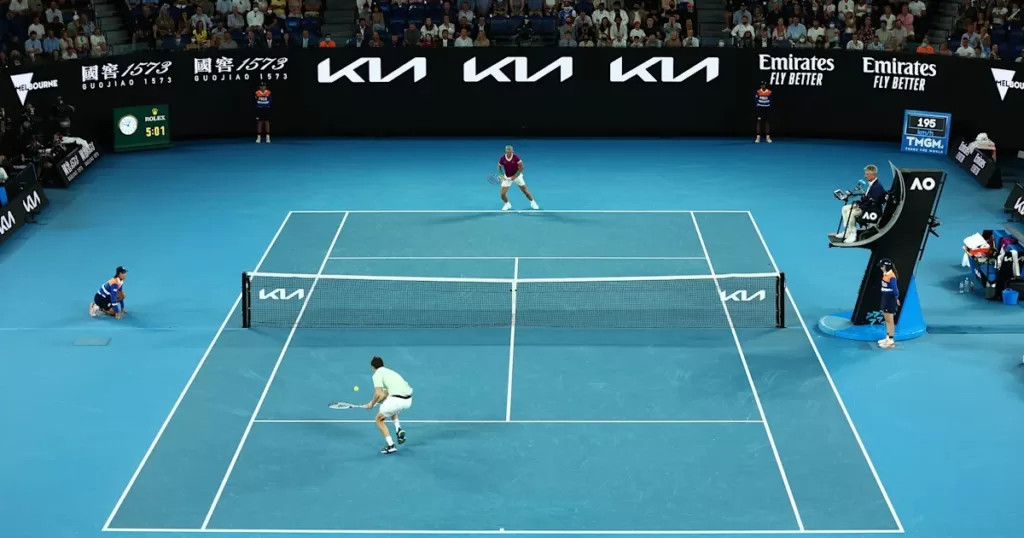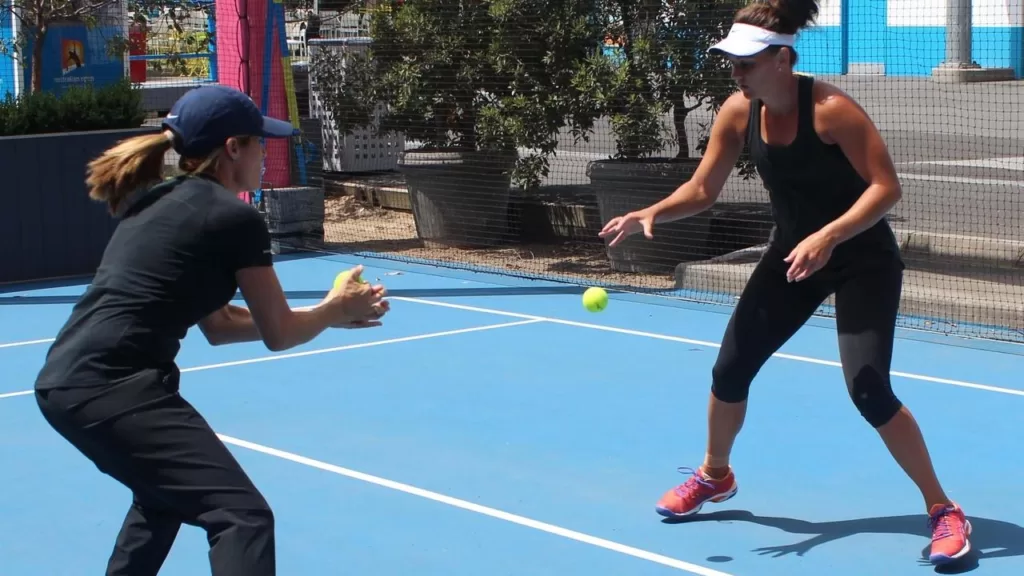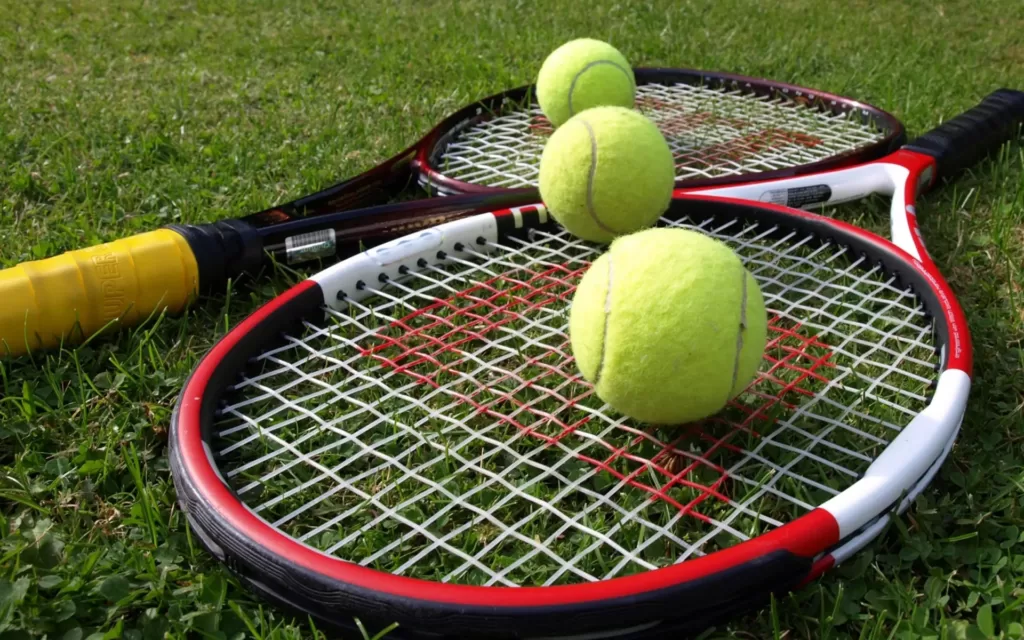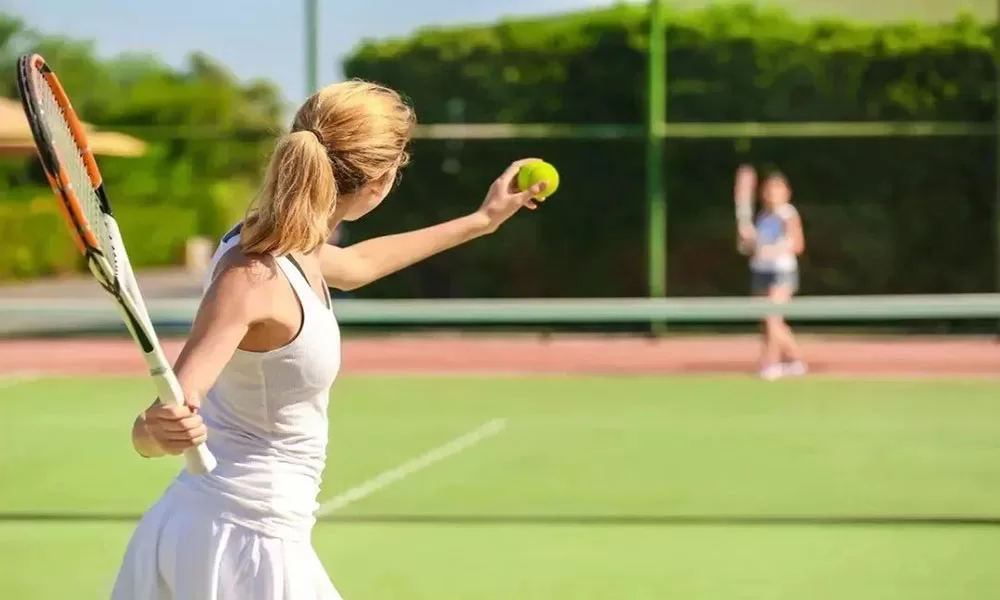Tennis is a popular sport that not only allows people to enjoy the sport but also helps them to stay healthy. In addition, tennis has many other uses, such as socializing, competition, and recreation. However, becoming a good tennis player requires constant training and practice, and we will discuss how to do tennis training next.

What are the Basic Movements of a Tennis Ball Training?
In addition to the following basic movements, tennis has some other techniques and tactics, such as ball rolling, ball release, and picking high balls, which need to be learned and improved during training and matches.
Tennis Strokes: Mastering the Basics
Forehand: The forehand is one of the most common ways to hit the ball in tennis. The player stands on one side of the net and uses the same side of the arm to swing forward and then up to hit the ball into the opponent’s court.
Backhand: The backhand is another common way to hit the ball in tennis. In contrast to the forehand, the backhand requires the use of a non-identical arm to hit the ball. The backhand can be hit with either a one-handed backhand or a two-handed backhand.
Tennis Serve Techniques: Initiating the Game
Serve: The serve is the opening move in a tennis match and is an important way of switching between offense and defense. When serving, the player stands in the serving area and uses a strong swing to serve the ball to the opponent’s court. There are forehand serves and backhand serves.
Tennis Court Movement: Enhancing Agility and Positioning
Interception: Interception is the action of quickly approaching the net to intercept the ball during the opponent’s serve or return. Interception requires quick reaction and accurate judgment and requires a certain level of skill and physical fitness.
To approach the net: To approach the net refers to the action of the hitter moving forward quickly and rushing to the net after serving or returning the ball. Going to the net can strengthen the attack and create pressure on the opponent, but it also requires technical and awareness support.
How to Hold the Racket Correctly?
A proper tennis grip can improve a player’s game and accuracy. The following is the correct grip:
- Place the palm of your hand on the handle of the tennis racket with your fingers apart and the tips of your fingers on the surface of the handle.
- Place your thumb on the back of the handle and bend it at an angle perpendicular to your fingertips.
- Hold the tennis racket handle between your thumb and fingers and use the strength of your fingers to grip the handle firmly.
- Wrap the palm of your hand firmly around the handle, but do not grip it too tightly.
- Keep the wrist of the grip in its natural state, without bending or twisting it.
- Make sure that the arms and shoulders of the grip are relaxed, as this will help the player control the racket better.
- When gripping the handle, you should feel the even strength of the fingers and palm, which will help the player to have a better grip on the racket.
- Finally, the grip should feel comfortable and natural in the hand, which will allow the player to focus more on the game or training.
How to Improve the Reaction Speed of Players?
It is important to improve a player’s reaction time in tennis training. Here are a few effective training methods that can be selected and combined according to the actual situation.
- Increase the speed of the tennis ball: Training with a faster ball can help players react and respond faster. The speed of the ball can be gradually increased to allow the player to adapt to faster ball speeds.
- Use reaction training equipment: Using specialized equipment can help players improve their reaction speed and agility. For example, reaction ball robots, and reaction ball walls.
- Use reaction training games: You can use some interesting reaction training games during training, such as reaction board games, eye-hand coordination games, and so on. These games can exercise players’ reaction speed and hand-eye coordination ability.
- Strengthen physical training: By enhancing the balance, coordination, and explosive power of the body, the player’s reaction speed and agility can be improved. You can do jumping, resistance training, and balance board training.
- Increase game experience: Participating in more games can help players practice reaction speed and agility in real game scenarios, as well as improve their game skills and experience.
How to Perform Foot Training to Improve Mobility?
Foot training is a very important part of tennis training to improve a player’s mobility and coordination. The following are some common foot training methods, which should focus on the correct movements and posture to avoid injuries caused by incorrect training.
- Running training: Performing aerobic exercises can improve a player’s endurance and ability to run fast. Running training can include sprinting, long-distance, slope, and interval running.
- Explosive power training: Explosive power training can improve the player’s ability to move quickly. Training such as high lift, sprint, and jump can be performed.
- Lateral movement training: In tennis, lateral movement is significant. Lateral squat jumping, lateral fast running, pace jumping, and other training can be performed to improve the player’s lateral movement ability.
- Forward and backward movement training: Forward and backward movement is common in tennis. You can train front and back fast running, backward running, jumping backward, and so on.
- Double-foot coordination training: Tennis game requires a constant change of pace and direction, so double-foot coordination training can improve the player’s flexibility and coordination. You can do single-leg jumping, cross-step jumping, tumbling training, and so on.
How Does Physical Training Enhance Endurance and Strength?
Physical training is a very important part of tennis training to increase a player’s stamina and strength and improve game performance.
- Aerobic training: Performing aerobic exercises can improve players’ cardiorespiratory function and endurance. Training such as jogging, brisk walking, swimming, and rope skipping can be performed, and each training session should last at least 20 minutes.
- Resistance training: Through weight training equipment, players’ muscle strength, and endurance can be enhanced. Bench presses, squats, pull-ups, dumbbell training, and so on. can be performed.
- Explosive power training: The tennis game requires a constant change of direction and speed, explosive power training can improve the player’s reaction speed and fast running ability. You can do sprinting, jumping, kicking, and other training.
- Core muscle training: You can enhance the player’s balance and stability by training the core muscle groups. Can carry out flat support, sit-ups, and balance board training.
- Flexibility training: Flexibility training can prevent sports injuries and improve the flexibility and agility of players. You can do yoga, stretching training, and ball training.

How to Do Tennis Tactical Training?
The following are some common tactical tennis training methods that can be selected and combined according to the actual situation. Pay attention to the communication with your coach and partner during the training to correct mistakes and adjust the tactics in time.
- Technique training: Before tactical training, players need to master the correct technique. You can practice forehand, backhand, serve, and interception techniques to improve players’ ball control and hitting accuracy.
- Opponent analysis: In a match, the opponent’s strengths and weaknesses can influence the player’s tactical choices. You can analyze and study the opponent by observing the video and knowing the opponent’s historical record.
- Offensive Tactics: By choosing the right ball path and attacking the opponent’s weaknesses, you can gain initiative in the match. You can train front-court net tactics, far-end attack tactics, and downward spin attacks.
- Defensive Tactics: When facing a strong opponent, correct defensive tactics can keep the player stable and have the opportunity to counterattack. You can perform drills such as far-end defense, short ball slap return, and return position drills.
- Change tactics: By changing ball speed, ball path, and ball type, you can disrupt the opponent’s rhythm and improve the player’s winning rate. You can train on changing balls such as cutting balls, pulling arc balls, and putting small balls.
How to Prepare Mentally Before the Competition?
The right mental preparation in a tennis match can help a player perform at his or her best.
- Define goals: Players should be clear about their goals for the game, including tactical goals, technical goals, and mental goals. Clear goals can help players stay focused and motivated.
- Firm confidence: Players should believe in their own strengths and abilities and firm up their self-confidence. Confidence can be enhanced by reviewing their game history and training results.
- Control emotions: It is normal to have mood swings during a game, but players need to learn to control their emotions in order to avoid them from affecting their play. Emotions can be controlled by taking deep breaths and relaxing muscles.
- Plan the game: Players can make a game plan by previewing the game process. The plan includes tactics, techniques, the pace of play, and so on. It helps players to cope with the game better.
- Think positively: Players should think positively and focus on opportunities in the game and ways to solve problems instead of worrying too much about failing or making mistakes.
- Have the right attitude: Players should approach the game with a positive attitude, do their best, and enjoy the process of the game. No matter what the result of the game is, they should face it with the right attitude.
What are the Physical Benefits of Tennis?
Tennis is a full-body sport that not only provides exercise but also has many other benefits for people of all ages.
Cardiovascular Health: Boosting Heart and Lungs
Enhance cardiorespiratory function: Tennis is an aerobic exercise, which can increase heart rate and breathing rates, thereby enhancing cardiorespiratory function.
Body Mechanics: Enhancing Movement and Strength
Improve body coordination: Tennis requires constant running, spinning, stopping, and other movements, which can exercise body coordination and a sense of balance.
Increase strength and stamina: In tennis, a constant force is required, which is very helpful to increase strength and stamina.
Improve flexibility: Tennis game requires running in different directions, bending, and other movements, which can improve the flexibility of the body.
Mental Well-being: Relieving Stress and Enhancing Social Skills
Reduce mental stress: Tennis requires concentration and reaction speed, which can relieve stress and relax the body and mind.
Promote social communication: Tennis is a sport that can be played with others and can increase opportunities for social communication.
What are the Social Uses of Tennis Balls?
Tennis is not only a fitness sport, it is also a rewarding social activity. By participating in tennis activities, you can make new friends, strengthen relationships, relieve stress, increase self-confidence, and enjoy the sport.
- Make new friends: On the tennis court, you can meet people of different backgrounds and ages and make new friends. By interacting with players of different levels, you can learn different skills and tactics, as well as expand your network circle.
- Strengthen relationships: Through activities on the tennis court, you can strengthen the relationships you already have. Playing with friends in a tournament can improve mutual understanding and improve communication and coordination skills.
- Stress relief: Relaxing on the tennis court can relieve the stress in your daily life. Playing with friends can make you forget about work and family stress and enjoy the fun of sports.
- Increase self-confidence: By showing your skills and tactics on the tennis court, you can increase your self-confidence. Winning or losing in a match can make you understand your strengths and weaknesses so that you can improve yourself better.
What is the Role of Tennis in Children’s Education?
Tennis plays a very important role in children’s education, not only promoting physical health but also fostering teamwork, self-confidence, motivation, and interest in learning, laying a solid foundation for children’s overall development.
- Develop a healthy lifestyle: Tennis is a healthy sport that can help children develop good habits and a healthy lifestyle.
- Improve physical fitness: Through playing tennis, children can exercise their flexibility, coordination, and stamina, and improve their physical fitness.
- Cultivate teamwork: Tennis requires working with a partner to develop children’s teamwork and communication skills.
- Cultivate self-confidence: In tennis, children need to overcome various difficulties and challenges to win through hard work, which can enhance self-confidence and courage.
- Cultivate a positive and aggressive spirit: Tennis matches require children to make quick responses and decisions in a short period of time, which cultivates their positive and aggressive spirit.
- Enhances interest in learning: Tennis is a fun sport and through participation in tennis, children’s interest and motivation in learning can be enhanced.

결론
This article is about how to do tennis training and other uses of tennis balls, hope it will be helpful to you. We are a professional manufacturer of polyurethane tennis balls and support wholesale and customization. Anyone who is interested can contact us at any time.

